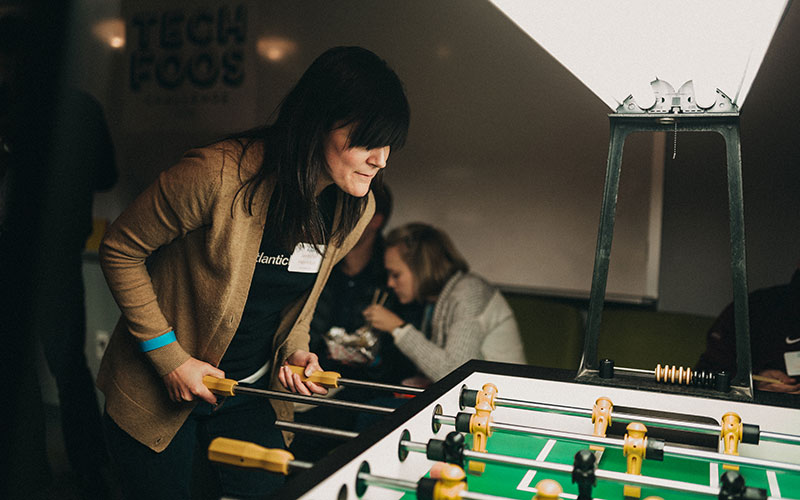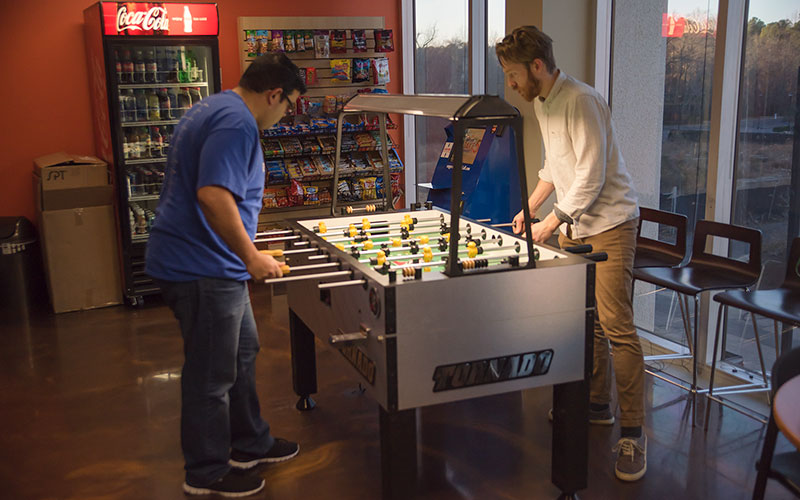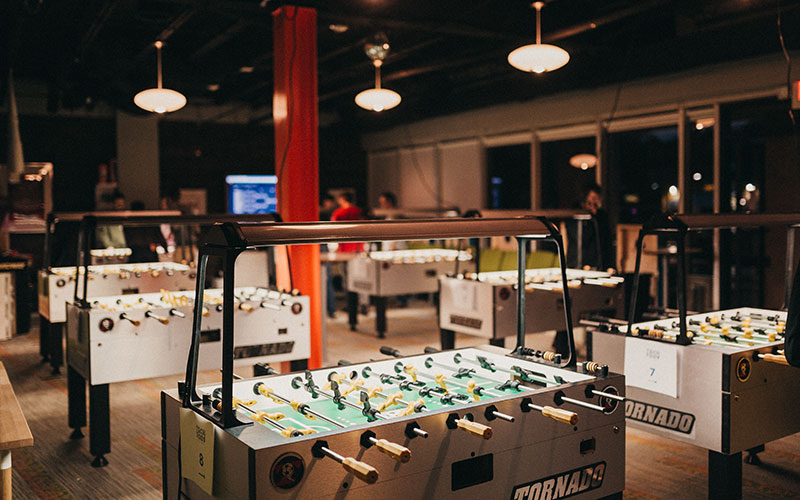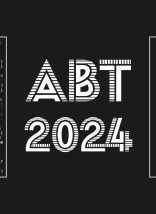I want this blog post to go out to all the talented folks in Raleigh who are looking for a job at a place that gets them. A place that understands what it takes to be productive in today’s workforce. A place that says, “Yes, it’s not just OK to play foosball at work—it’s encouraged.” After reading this post, I hope you’ll agree with me—that place is Atlantic BT.

The author (right) and his brother compete in a foos-focused outreach event at ABT.
Give Your Old Breaks a Break
Let’s start off with what happens at other places. Take my first job at a labor union. We had two break rooms, each consisting of a table or two, some chairs, a microwave, and a TV. Our lunchtime release was the last half of “The Young and the Restless” and then all of “The Bold and the Beautiful” because “The Bold and the Beautiful” was only a half-hour soap. (Shout-out to Steffy and Hope.) That’s not bad. It wasn’t good, either, and you better not get caught watching that TV during non-lunch hours. The labor union was great to us as workers and they were very adamant about breaks, but they only wanted those breaks to happen according to a schedule. It was like they were brokering with themselves for better workers’ rights but didn’t quite know how to be both sides of that deal.
Then I worked at a copywriting agency. This is where things got tricky because our boss wanted us to have the ultimate flexibility to work anytime, anywhere … as long as we were working all the time, everywhere. You were supposed to be in charge of your own day, and in his mind, that meant we were in charge of our own breaks … and somehow, since we were in charge of our own breaks, we shouldn’t have to take any. There wasn’t anywhere to take a break anyways. Our break room consisted of a microwave-sized alley off our common area that featured a file cabinet full of writing samples that was nine times bigger than a microwave. It was cramped (especially considering there was actually a microwave in there, too).
What’s happening here? Well, in my experience, managers know they have to let us take breaks or we’ll pop/burn out/quit. But they’re deathly afraid that breaks will turn into lost productivity, lost cash, and lost respect toward the management team. Just look at what Bob Fox of FOX Architects has to say about it in a 2011 post he wrote about foosball for the online publication he founded, Work Design Magazine. He bought his employees a foosball table because he wanted to reward them for being hard workers, but right afterward, “the concerned, managerial voice in the back of my head was saying, ‘Keep an eye on productivity, Bob.’”
Can you believe that? He gets his employees something as a reward for working hard and immediately fears this will stop them from working hard. Luckily for Fox’s team, Fox kept an open mind and actually looked at the productivity numbers. “After six months, watching the numbers became a total waste of time,” Fox said, “Why? Because what I found was refreshing, surprising, and very impressive: productivity actually increased—and not by a little bit—by 10-15 percent.”

Two of our top programmers, Chris Duffy and Jeremy Wiggins, boost their productivity with foosball.
Make a Break For Better Breaks
How can that be? Here’s a small content stub and an infographic on gamification that prove with science what common sense already tells us: Games like foosball help us take breaks in a way that stimulates our minds, gets our blood flowing (because sitting at our desks all day does the opposite), and pumps up our dopamine and testosterone levels. The result is we leave the break room wanting to extend our foosball table winning streak to our work problems, our conference rooms, and our negotiation tables. Games at work also boost employee teamwork both for people on the same level of the company’s hierarchy and for people on different levels. Here’s Bob Fox again:
“Our staff started including more competitive individuals whose enthusiasm seemed to translate from the foosball table to the conference room table. …The playing field, so to speak, was even during those competitions … I was the boss, but couldn’t play to save my life … my employees loved that. …Business conversations would occur spontaneously over the foosball table. I realized that work was actually getting done while people were ‘disconnected’ from their desks. …But perhaps most importantly, I saw from a business standpoint that my team was building communication.”
Break Records at ABT
One of the things I like most about working at ABT is our management team is very much like Bob Fox. Unlike my old copywriting agency, we have a break room. (Two, actually: One on our third floor and an even bigger one on the first.) Unlike my old labor union, our break room is more than just a TV with daytime soaps on it: We have a foosball table on the third floor and an arcade, beer/liquor/wine bar, and ping-pong table on the first (Though we could stand to get some daytime soaps on the TVs, now that I think about it. Steffy and Hope aren’t going to fight over the same guy without an audience.). And listen to this: Not only are we in charge of our own breaks, we’re allowed to take them. Our management team understands that what looks like goofing off is actually a way for us to get revved up for more work, or to keep working on something that’s just not making itself happen at our desks, or to get closer to the folks we’re teamed up with on a big, tough project.

Our head of HR Jennifer Herndon plays foosball, and she wants you to do the same.
Let me give you examples from my own time at ABT (which, O talented folks here in Raleigh, is more than three years). Teamwork is the first thing I’ll cover. As an account executive, I’m expected to motivate people to get work done on time under budget with smiles on their faces—but I cannot command anyone to do anything because my role is not above those people. In this pursuit, building friendships and teamwork around the foosball table has been hugely helpful. I didn’t play foosball, however, for the first year I worked here. I didn’t even know how to play, but after watching the people I worked with having a lot of fun, I decided I wanted in.
I taught myself to play, then played with and against application architects, software architects, .NET programmers, PHP programmers, other account executives, project managers (and our director of project managers, whom I love to beat), IT team members, and front end developers. That’s a huge swathe of the company with whom I now have a deeper understanding, a better work tone, and a better sense of mutual respect. I’m always tickled by this one front end developer because we kind of figured out spontaneously that we make a fantastic foosball team (as long as he’s on offense and I’m on defense). Do I like the guy more now simply for that reason? Do we get along because we’re proud of the wins we shared against “the other guys?” Is it much easier to get him to do work on time under budget with a smile on his face because we’ve teamed up? The answer to those three questions is yes, one hundred percent.
Let’s treat “working away from our desks” second. Bob Fox is right about these spontaneous conversations. We’ll be halfway through a game when the software architect jumps straight into a conversation with his teammate, a front end developer, about the progress he’s made on a structural task that the front end developer needs done before he can do his own work. I’ve had that director of project managers (the one I love to beat) jump right into a conversation with me about what we should do to unstick a problem on one of the accounts we share, and it’s easier for us to be totally truthful about what should be done because neither of us are worrying about the fact that his role is well above mine in the company. We’re just two guys trying to get the same thing done. We’re on a team even though we’re playing foosball against one another. I’ve started conversations, too, like with our IT team. We’ll be playing, and I’ll say, “So what happened with that site outage?” And for some reason, since we’re not at our desks or in the even more formal setting of a conference room, it’s much easier for the guy to say, “Yeah, I forgot to flip this one switch before running the site update. I figured out what I did wrong, fixed it, and ran it again. It worked.” And I say, “Hey, no problem, I’ll let the client know what happened and that we’re putting things in place to make sure it doesn’t happen again.” It could have been a tense talk if I were at his desk, but because I brought it up at the foosball table, we skipped the awkward emotions and went straight to resolving the issue.

Edwin and Jorma build trust in our break room.
This brings me to one thing I don’t see Fox talking about, and this may be because he’s at the top of his company and not a rank-and-file employee like me: Playing games like foosball can take the tension out of a strained workplace relationship. I don’t have space to go into detail here, but let’s just say I used an intensely competitive game of foosball to help me get to a better place with a coworker who was less than thrilled with me from our very first moment. He may still be less than thrilled with me, but at least now I feel more able to handle our exchanges (my winning that tough match might have helped). Over time, the way I approach him has changed how he approaches me. It’s a virtuous cycle put into place by a fun game, and that kind of virtuous cycle really happens thanks to our management team. ABT’s leadership knows that working through our relationship over a game of foosball isn’t a waste of time. In fact, it may be the best use of our time, especially considering we’re hashing things out in a healthy way away from our desks.
Break Me, I Dare You

The table is ready. I’d love you to come challenge me.
So, are you one of those talented folks here in Raleigh that wants to work for a management team that gets it like Bob Fox does? You’re welcome to challenge me to a game of foos right here at ABT, any time you want. I’m just as happy to take you on in chess, ping-pong, or any of our arcade games. Shoot, I’ll thumb wrestle you if that’s what you want. Once I’m done breaking your back, I’ll build you back up with tales about the cool work we do and the fun things we do, like Culture Club events, Thirsty Thursdays, Pumpkin Chunkins, and more. I’ll even help you fill out an application to join us, especially if you’re an account executive. Why? Because I welcome the competition.
Why don’t you take a look at what’s open right now?
__
Stewart Arthur Pelto is an account executive. Taking foosball breaks helped him draft this post.
SOURCES:
Fox, Bob. (2011, Feb. 2). Back to the Foosball [Blog post]. Retrieved Jan. 13, 2017, from
The Gamified Brain: A Study of the Effects of Gamification On the Brain [Infographic].
Holtzclaw, Eric. (2014, Nov. 11). How Playing Games Increases Workplace Productivity [Article].
Retrieved Jan. 13, 2017









